D&D 5e spell scrolls featured image by Wizards of the Coast in the Dungeon Master’s Guide and background from Strixhaven: Curriculim of Chaos.
This article contains affiliate links that add gold to our coffers.
I enjoy exploring D&D 5e’s mechanics to freshen up the game. To my delight, the recent addition of the Order of Scribes Wizard in TCoE inspired me to experiment with spell scrolls (don’t tell my parents). Spell scrolls are interesting magic items that you can easily plop into your game without worrying about long-term game balance. Spell scrolls are limited resources that make. D&D 5e spell scrolls should relieve DMs and delight players. Spell scrolls are interesting, accessible rewards.
I’ve summarized everything I know of them in an expression of my love for them:
- What is a spell scroll?
- Where do spell scrolls originate?
- How can a player character create a spell scroll?
- Who can use spell scrolls?
- Wizards and spell scrolls
- What are the spell attack modifiers or spell save DCs for spell scrolls?
- Can Thief Rogues use Fast Hands to activate a spell scroll as a bonus action?
- Artificers and spell scrolls.
- Can spells be stored in non-scroll items while using spell scroll mechanics?
- Does Counterspell work on spell scroll casting?
- Variant rule for mishaps when spell scrolls fail to cast.
What is a spell scroll in D&D 5e?
The DMG describes a spell scroll as a magical item that “bears the words of a single spell, written in a mystical cipher.” A spell scroll magically holds a spell in its parchment. Activating a spell scroll unleashes the spell within. Scrolls (described in the DMG) are rolls of paper, sometimes attached between wooden rods. D&D 5e scrolls store in protective containers like tubes, jars, and boxes. Examples of container crafts are “ivory, jade, leather, metal, or wood.”
Using a scroll will result in its destruction as it crumbles to dust, classifying a scroll as a consumable item (please don’t eat them). The DMG (p.200) unintuitively indicated that every spell scroll required an action to use at publication. DMG errata altered the activation of a spell scroll to use the spell’s normally affixed casting time.
Not all scrolls are “spell scrolls.” Some scrolls produce effects that are beneficial or harmful without technically casting a spell. Few scrolls “bear unique incantations that produce potent wards” that are not based on spells (DMG p.139). A Scroll of Protection exemplifies a scroll that contains an incantation with a magical effect that has nothing to do with any spells.
You can find a full description for spell scrolls on D&D Beyond.
Where do D&D 5e spell scrolls originate?
Players find, purchase, or create spell scrolls. The DMG‘s loot tables include spell scrolls of various spell levels and rarities.
Spellcasters can create their own spell scrolls at a cost. Crafting a D&D 5e spell scroll requires material components and anything else the spell requires. Activating a spell scroll does not require the material components. Skipping material components is one reason spell scrolls make excellent loot.
How can a player character create a spell scroll?
Rules for magic item crafting are in the DMG on page 129. Errata for the DMG clarifies that consumable magic items, like scrolls or potions, require half the time and cost indicated in the Crafting Magic Items table.
Flutes Loot has more articles on crafting magic items. Opal has created a brilliant summary of magic item crafting you can reference here. You can find all our articles on crafting magic items here.
I’ve included a summary of the Crafting Magic Items table below. Calculate time and gold requirements per the text at four eight-hour days per hundred gold. I’ll indicate how the numbers change for a spell scroll as a consumable magic item. You can freely adjust the cost and time of crafting to suit your game. The default time requirements are too long for most players. I recommend shortening craft time if you want to enable players to do it. Anyway, here’s the info from the table:
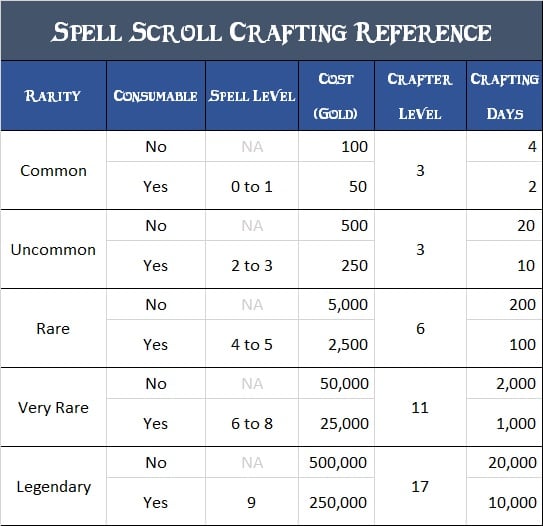
The Order of Scribes Wizard (TCoE) can cut spell scroll crafting cost and time in half. The level-ten Master Scrivener feature allows a Scribe Wizard to be the best spell scroll crafters in the game. The easiest spell scroll for a Scribe Wizard to craft is the common spell scroll, requiring a mere 25 gold and a single day of crafting.
Find tips for incorporating magic item crafting into your game with this article by Opal.
Scribing Spell Scrolls According to Xanathar’s Guide to Everything
If you want more details about scribing spell scrolls beyond the normal rules for crafting magic items, XGtE goes into greater detail. For one thing, you must have proficiency with Arcana to scribe (create/craft) a spell scroll. The spell to be placed in a scroll must be prepared or known by the spellcaster (prepared for Wizards, known for Sorcerers, for example).
It also clarifies that a cantrip in a spell scroll is treated as if the caster is a first-level character.
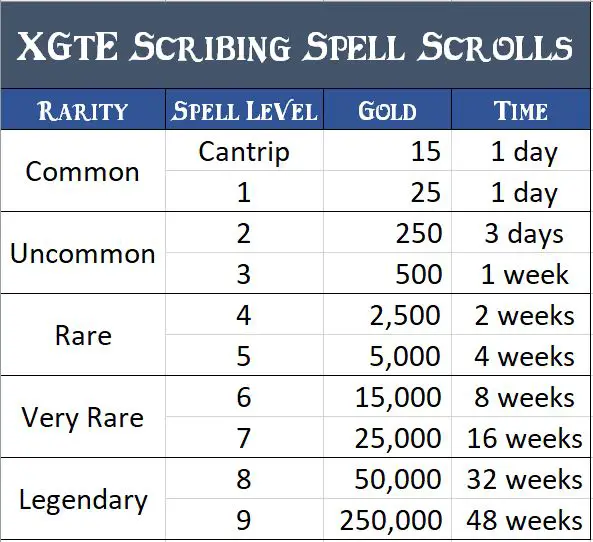
XGtE also suggests a 10% chance of a complication each week, often involving a rival interfering with your process. Xanathar’s has rules and suggestions for rivals, so it makes sense to use rivals for these crafting rules. You can find suggestions for complications on the same page (p.133), but it’s a light table that is more for inspiration to tailor your own complications for players.
How can a player buy spell scrolls in the Adventurer’s League?
XGtE guides Adventurer’s League characters to buy and sell D&D 5e spell scrolls up to level five. This table is solely for the Adventurer’s League (official organized 5e play), and only a character capable of casting the spell on the spell scroll can buy it. DMs decide how magic item shops and arcane peddlers sell and price spell scrolls outside of Adventurer’s League.
Again, this only applies to Adventurer’s League!
- Cantrip 25 gp
- First-level 75 gp
- Second-level 150 gp
- Third-level 300 gp
- Fourth-level 500 gp
- Fifth-level 1,000 gp
Who can use spell scrolls?
The ability to cast a spell from a scroll is dependent on your character’s class spell list. Clerics cannot cast Fireball from a spell scroll; Wizards can. As an exception, Light Domain Clerics can cast Fireball as a Domain Spell. Multiclassed characters can reference the spell list of each of their classes to determine if they can use a particular spell scroll.
The next detail to review is regarding spell level in spell scrolls. It is difficult for a character to activate a spell scroll that contains a spell of level that exceeds the character’s spellcasting ability (a higher-level spell than what the character can cast with its spell slots). The DMG requires characters in this scenario to roll ability checks with spellcasting modifiers to attempt successful casting. On a failure, the spell within the scroll fades away forever as the spell fails to take effect.
Wizards and Spell Scrolls
Spell scrolls often make players think of Wizards. The Wizard class loves spell scrolls. Wizards can use spell scrolls to copy an embedded spell from a spell scroll into their spellbooks. By the rules in the DMG (p.200), a Wizard copying a spell from a spell scroll will require an Arcana check at DC 10+spell level. However, the PHB Wizard section on page 114 titled “Your Spellbook” does not mention an Arcana check. Ask your DM if copying spells from scrolls to your spellbook will require an Arcana check. In my experience, DMs don’t typically require the Arcana check. I don’t know if game designers consciously did this or didn’t know what the DMG says vs. what the PHB says.
It is unclear if an upcasted embedded scroll will be copied with the DC of the upcast level or the base spell level. I recommend using the base level in these cases. Copying a spell from a scroll results in the destruction of the spell scroll as it transfers to the spellbook. The spell scroll is destroyed irrespective of success or failure on the Arcana check.
What are the spell attack modifiers or spell save DCs for spell scrolls?
Modifiers and DCs for spells cast with D&D 5e spell scrolls are dependent on the level of the embedded spell. I believe this means you can upcast a spell when you cast it in creating a spell scroll to increase the DC or modifier of the spell once released from the scroll. Page 200 of the DMG indicates DCs and modifiers in a reference table by spell level. Here’s a quick overview of DCs and spell attack bonuses by spell scroll level.
- 0-1: Common, DC 13 or +5 attack bonus.
- 2-3: Uncommon, DC 15 or +7 attack bonus.
- 4-5: Rare, DC 17 or +9 attack bonus.
- 6-8: Very Rare, DC 18 or +10 attack bonus.
- 9: Legendary, DC 19 or +11 attack bonus.
The person who activates a spell scroll becomes the spellcaster for concentration and other spell specifications. In other words, you can’t use a spell scroll to get around concentration (the Glyph of Warding spell can do that).
In my opinion, it’s reasonable for a DM to decide that a spell scroll created by a specific character would reflect the DC and spellcasting modifier of the character. This would differ from the basic method of determining DC and modifier by the level of the spell. If your group chooses to embrace this opinion, spell save DCs and spell attack modifiers would be based on the original spellcaster who created the spell scroll, not the person activating the spell scroll.
Can Thief Rogues use Fast Hands to activate a spell scroll as a bonus action?
No, unfortunately. Fast Hands is a useful ability for a Thief that allows activation of non-magical items as bonus actions instead of actions. Spell scrolls are magic items (like wands or potions), so Fast Hands won’t work with spell scrolls.
However, Thieves of thirteenth level gain the Use Magic Device feature. This ability allows Thieves to cast spells from spell scrolls… any spell scrolls. A Thief could cast a spell of any level from any class spell list. Use Magic Device synergized with spells scrolls is one more reason to love the Thief (evidenced by my Rogue subclass ratings).
Artificers and Spell Scrolls
Artificers love spell scrolls because several of their class features synergize with them. An Infusion named Enhanced Arcane Focus (from level two) gives Artificers a +1 bonus to spell attack roll spells. The bonus rises to +2 at level ten. Activating a spell scroll means the user is casting a spell, so spell scrolls apply with Enhanced Arcane Focus.
Flash of Genius at level seven can grant you or an ally a bonus equal to your Intelligence modifier when making an ability check to use a spell scroll of a higher level. This ability helps you and your allies to use spell scrolls that require ability checks. It’s a great way to make sure your team succeeds when using spell scrolls.
Magic Item Adept at level ten allows you to craft spell scrolls with up to third-level spells (uncommon rarity) in a quarter of the time and half the cost. Since spell scrolls are consumable (time and money halved to craft), an Artificer with Magic Item Adept crafts low-level spells scrolls in 1/8th of the normal time and 1/4th of the normal cost.
Finally, Magic Item Savant at level fourteen grants you the same ability as the Thief rogue to use any magic item regardless of class, race, spell, or level requirements. Artificers are so versatile! You can use any scroll (any magic item) without needing to meet any of the requirements.
Can spells be stored in non-scroll items while using spell scroll mechanics?
By the book, no, but players and DMs are free to ‘flavor’ spell scrolls to be something else. Tasha’s Cauldron of Everything clearly encourages D&D 5e players to be creative with reskinning core mechanics. Artificers can store spells in items, but that’s not what I’m talking about. I’m referring to your creative freedom to pretend a spell scroll is an ancient artifact, a lucky charm, a bell, a rare flower, or any other item that sounds fun for you to use with spell scroll game mechanics. I recommend justifying your creativity with the ability to place arcane runes on an item by ink or carving.
Does Counterspell Work on Spell Scroll Casting?
By the rules after DMG errata, maybe?! The errata explains that spell scrolls negate material components for casting, but magic items generally do not require verbal, somatic, or material components to cast spells with them. This Jeremy Crawford tweet implies that even without VSM components, the spellcasting would still be perceptible as the activation of the scroll is perceptible (implying Counterspell would work).
This is 100% one of those “ask your DM” rules. I’ve done enough research for you to know that’s the conclusion, haha!
Sage Advice 1 on the subject, and Sage Advice 2. You can start a healthy debate on Reddit about this if you’re in the mood for a rules war.
Variant Rule: Scroll Mishaps
One variant rule involves rolling 1d6 when spell scroll casting fails. A DM can choose to roll for these mishaps, though not all of them apply to all spells. I recommend ignoring the table if you would be casting certain spells like Raise Dead.
- “A surge of magical energy deals the caster 1d6 force damage per level of the spell.”
- “The spell affects the caster or an ally (determined randomly) instead of the intended target, or it affects a random target nearby if the caster was the intended target.”
- “The spell affects a random location within the spell’s range.”
- “The spell’s effect is contrary to its normal one, but neither harmful nor beneficial. For instance, a Fireball might produce an area of harmless cold.”
- “The caster suffers a minor but bizarre effect related to the spell. Such effects last only as long as the original spell’s duration, or 1d10 minutes for spells that take effect instantaneously. For example, a Fireball might cause smoke to billow from the caster’s ears for 1d10 minutes.”
- “The spell activates after 1d12 hours. If the caster was the intended target, the spell takes effect normally. If the caster was not the intended target, the spell goes off in the general direction of the intended target, up to the spell’s maximum range, if the target has moved away.”
Spell scroll casting failures can also feel like wild magic. The point is to make it feel like a magical accident with consequences. I encourage DMs to make a mishap list more interesting than this if they’re using scroll mishaps.
You should use D&D 5e spell scrolls in your game!
Tell your D&D 5e DM that you want to find spell scrolls from your class! DMs can provide monster loot that includes D&D 5e spell scrolls from your class spell list, expanding the spell options at your fingertips. Sorcerers can especially benefit from spell scrolls since they know few spells. Likewise, Warlocks will be grateful to obtain leveled spell options beyond their few Pact Magic spell slots. So keep spell scrolls handy for a rainy day, and you won’t be sorry. Don’t be a resource hoarder like me, though.
If this article has you feeling pumped to use spell scrolls more in your D&D 5e game, cast Message in the comments section below to tell me about it or ask questions! I’ll gladly update this article if you have a question I didn’t cover.
Before you go, thumb through our library of magic item crafting articles, they’re game-changing! If magic item crafting doesn’t sound interesting, we have many other top articles that may interest you. Thanks for reading, and good luck slapping your BBEG around with an arsenal of spell scrolls.

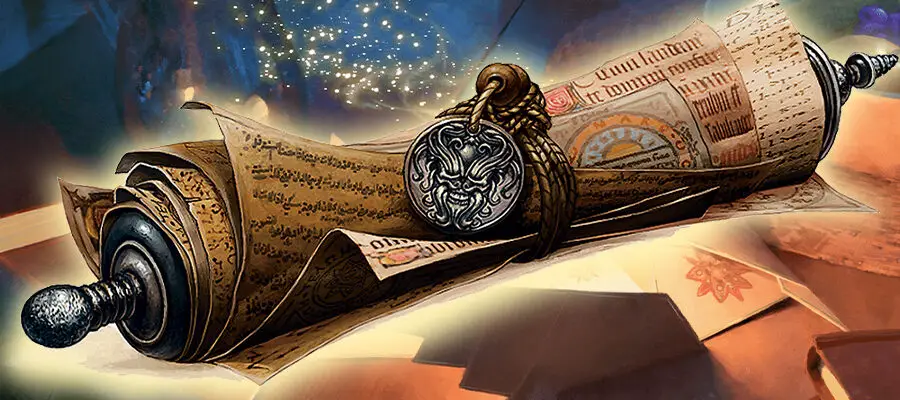
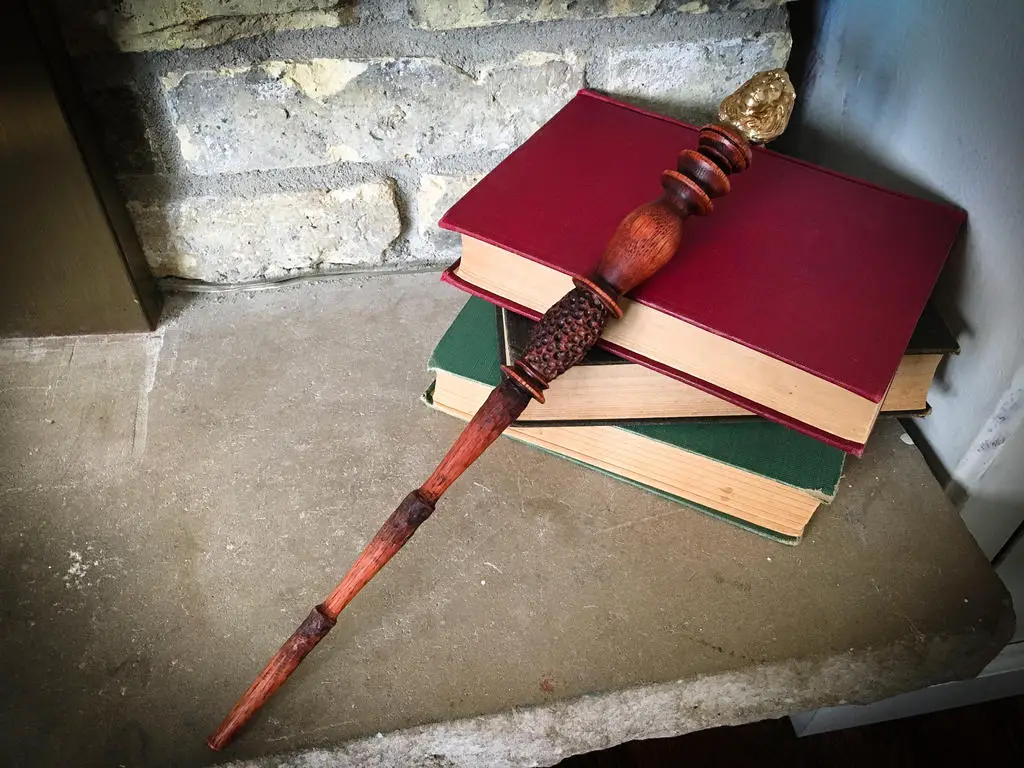
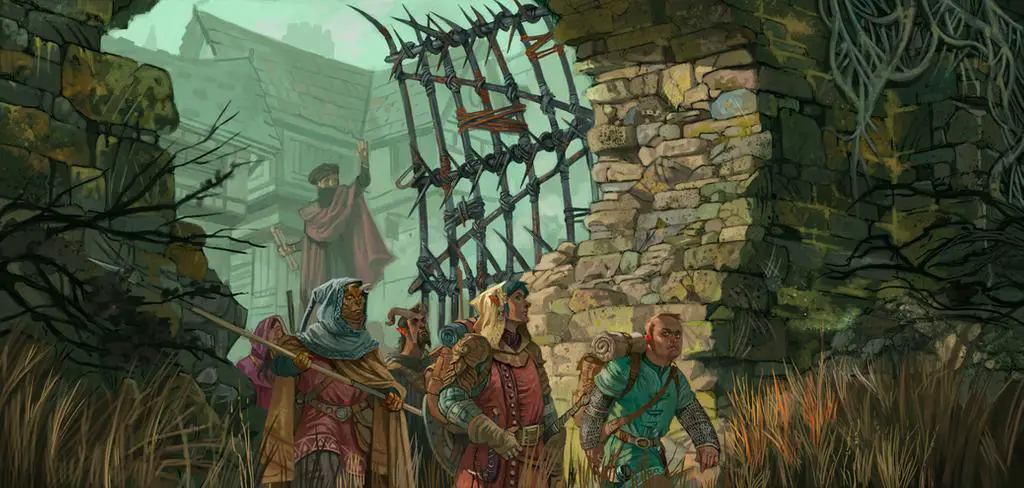
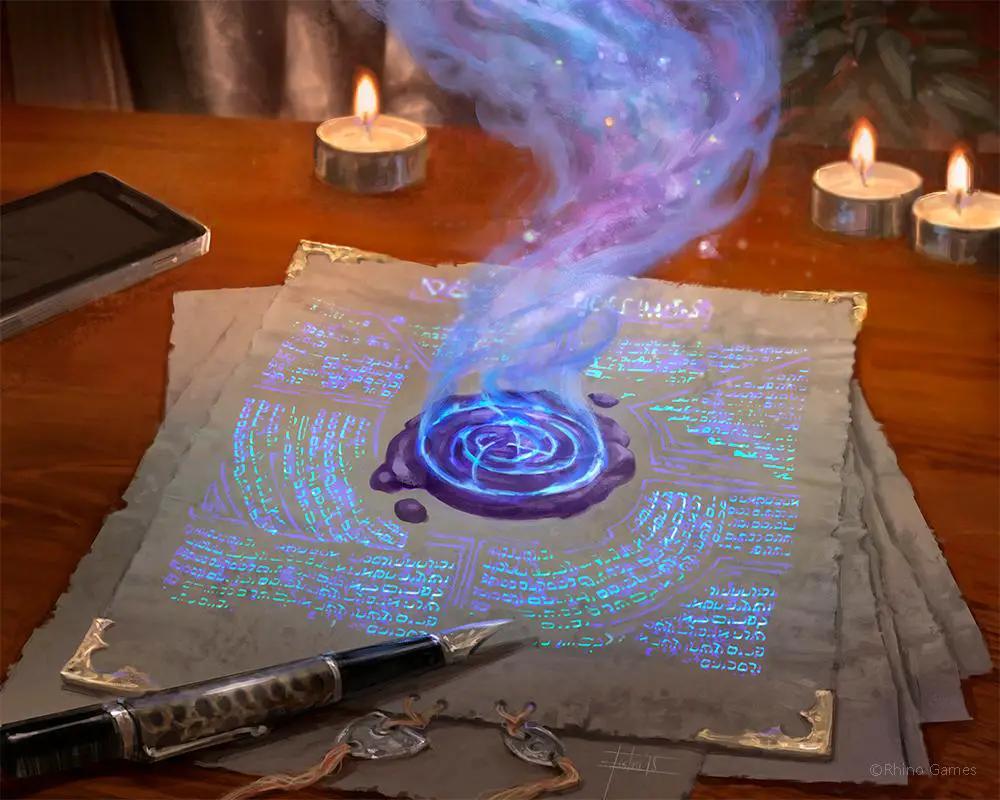
Since an arcane trickster is a spell caster, can we craft spells?
Yes, you can! Reference the article’s section entitled “Scribing Spell Scrolls According to Xanathar’s Guide to Everything”:
“If you want more details about scribing spell scrolls beyond the normal rules for crafting magic items, XGtE goes into greater detail. For one thing, you must have proficiency with Arcana to scribe (create/craft) a spell scroll. The spell to be placed in a scroll must be prepared or known by the spellcaster (prepared for Wizards, known for Sorcerers, for example).”
I am having trouble finding the reference where the spell dc and attack modifier for a spell scroll is based on the DC of the creator. The link to the DMG p200 does not specify that the table applies to unknown creators only. Is there another reference I am missing? I can’t see any reference to using the creator’s spell DC in the DMG or Xanathar’s.
Thanks for pointing this out. I can’t find a reference to back up my statement there about the creator determining the DC/modifier. I only find reference to the spell level determining those details. I’ll update the article to reflect this.
You say in your article that the table for DCs and attack modifiers is for found spell scrolls only and that crafted scrolls use the crafter’s stats but the only thing I can find in the books on the subject is that “The level of the spell on the scroll determines the spell’s saving throw DC and attack bonus, as well as the scroll’s rarity, as shown in the Spell Scroll table.” Could you please cite where the alternate rule for crafted scroll DCs is from or highlight the line in the DMG which specifies that the rule is only for found items?
That’s misinformation that I thought I removed from the article, but I missed two instances. I apologize, but thank you for pointing it out so I could fix it!
If you have an All-Wizard Party, can they collaborate on a spell scroll to speed up the crafting time? My players accidentally became an All-Wizard Party, and one of them is the scribe so I know it will come up soon…
I’d say allow it.
So, in the section about artificers crafting scrolls, you reduce the time by half by merit of the fact that they’re consumable items. So, are the values in the ‘Time’ column on the XTGE Scribing Spell Scrolls always halved, regardless of who’s scribing them? Is it the same for potions? Correct me if I’m wrong, but I feel like this is a case where specific beats generic.
The XTGE table is its own thing. It seems more favorable than using the DMG rules. I think applying the concept to potions makes sense.